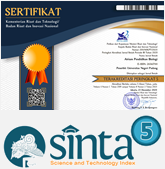The Influence of Thinking Aloud Pair Problem Solving (TAPPS) Learning Model Charged Science Literacy on Students Learning Competencies in the Material of Human Reproductive System at SMAN 1 Enam Lingkung
Abstract
Keywords
Full Text:
FullpaperReferences
Direktorat Pembinaan SMK. 2017. Materi Strategi Literasi dalam Pembelajaran di SMK.Jakarta: Kementerian Pendidikan dan Kebudayaan.
Elmanazifah, S. dan Syamsurizal. 2018. Pengaruh Model Pembelajaran Problem Based Learning Bermuatan Literasi Sains Terhadap Kompetensi Belajar Peserta Didik Kelas XI SMAN 1 Lubuk Alung. Bioeducation Jurnal, 2 (1), 1-10.
Handayani, F., R. Darussyamsu, G.H.Selaras, Syamsurizal. 2019. “Pengaruh Model Pembelajaran Kooperatif Tipe Talking Stick Bermuatan Literasi Sains Terhadap Kompetensi Belajar Peserta Didik Pada Materi Sistem Pencernaan Manusia di SMP Negeri 15 Padang”. Atrium Pendidikan Biologi, 4 (1). 54-65.
Multazam,T. Haris. 2018. “Peningkatan Kemampuan Komunikasi Matematis Siswa Melalui Metode Pembelajaran ThinkingAloud Pair Problem Solving (TAPPS)Pada Siswa MTS”. Skripsi. Aceh: Universitas Islam Negeri Ar-Ranniry.
Nurhidayati, F.,dan Sugiyono.“Pengaruh Srategi Thinking Aloud Pair Problem Solving Terhadap Kemampuan Komunikasi Matematis Dan Prestasi Belajar Siswa SMP”. Jurnal Pendidikan Matematika, 6 (3), 67-78.
OECD. 2012. PISA 2012 Result in Fokus What 15-years-olds know and what they can do with they knot. (http://www.oecd.org/pisa/keyfundings/pisa-2012-result overview.pdf. diakses 7 Januari 2019)
Pratiwi, Mairanti. 2014. “Pengaruh Metode Thinking Aloud Pair Problem Solving (TAPPS) Terhadap Kemampuan Berpikir Analitis Matematis Berdasarkan Level Kognitif Siswa”. Skripsi. Jakarta: Universitas Islam Negeri Syarif Hidayatullah.
Putri, M.E., Syakbaniah, dan Ratnawulan. 2016. “Pengaruh LKS Terintegrasi Sistem Gerak Tubuh Manusia Terhadap Hasil Belajar Fisika Siswa Dalam Pembelajaran Kooperatif Tipe Thinking Aloud Pair Problem Solving di Kelas XI SMAN 5 Padang”. Pillar Of Phisic Education, 7(3), 49-56.
Setiwati, P., N. Dantes, dan I.M. Candiasa. 2015. “Pengaruh Model Pembelajaran Kooperatif Thinking Aloud Pair Problem Solving (TAPPS) Berbantuan LKS Terhadap Sikap Sosial Dan Hasil Belajar Matematika Siswa Kelas VI SLB Negeri Gianyar”. e-Journal Program Pascasarjana Universitas Pendidikan Ganesha, 5 (1), 1-10
Triyanto, S. Anitah, dan N. Suryani. 2013. “Peran Kepemimpinan Kepala Sekolah Dalam Pemanfaatan Media Pembelajaran Sebagai Upaya Peningkatan Kualitas Proses Pembelajaran”. Jurnal teknologi pendidikan, 1(2), 226-238.
Wicaksono, T.P., Muhardjito,dan Harsiati. 2016. “Pengembangan Penilaian Sikap dengan Teknik Observasi, Self Assesment, dan Peer Assesment pada Pembelajaran Tematik Kelas V SDN Arjowinangun 02 Malang”. Jurnal Pendidikan, 1(1), 45-51.
Wulandari, N., dan H. Sholihin. 2014. “Analisis Kemampuan Literasi Sains Pada Aspek Pengetahuan dan Kompetensi Sains Siswa SMP Pada Materi Kalor2”. Jurnal Edusains, 8 (1), 66-73.
Wulandari N., Sukestiyarno dan Sugiman. 2013.“Pengembangan Karakter dan Pemecahan Masala Melalui Pembelajaran Matematika Dengan Model TAPPS”. Journal Of Mathemathics, 2(3), 41-46.
Yulianti, S., M. Chatri, R. Yogica, Syamsurizal. 2019. “ Pengaruh Model Pembelajaran The Power Of Two Bermuatan Literasi Sains Terhadap Kompetensi Belajar Peserta Didik Pada Materi Sistem Pencernaan Manusia di SMP Negeri 18 Padang”. Atrium Pendidikan Biologi, 4 (1), 30-41.
DOI: http://dx.doi.org/10.24036/apb.v4i3.6165
DOI (Fullpaper): http://dx.doi.org/10.24036/apb.v4i3.6165.g3606




